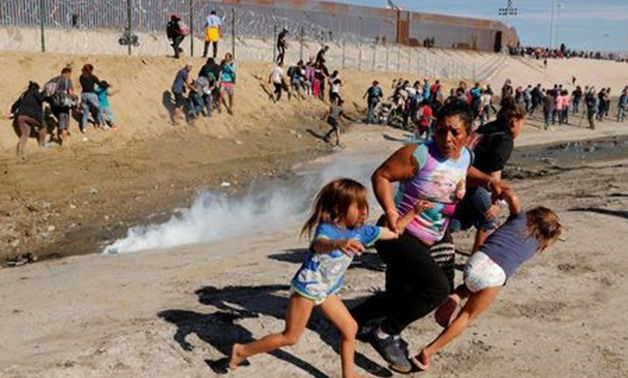
Maria Lila Meza Castro (C), a 39-year-old migrant woman from Honduras, part of a caravan of thousands from Central America trying to reach the United States, runs away from tear gas with her five-year-old twin daughters Saira Nalleli Mejia Meza (L) and Ch
TIJUANA (Reuters) - After nearly two weeks of documenting the harrowing journey of a caravan of mostly Central American migrants headed towards the U.S.-Mexican border, I snapped a picture I will never forget.
In the shot, taken on Sunday, you can see Honduran mother Maria Meza, 35, grabbing the thin arms of her two 5-year-old twin daughters Cheili and Saira as they frantically run from a tear gas canister spewing fumes.
Cheili is seen in diapers, Saira barefoot, while their mother wears a t-shirt showing the smiling sisters from the Disney hit “Frozen,” a movie I’ve seen many times with my own daughter.
Mesa’s 13-year-old daughter, Jamie, is behind her mother in the photo, also running away from the approaching gas.
In the frantic moments after the canisters hit the ground, the acrid smell was everywhere and I could see children crying, their eyes stung by the gas.
“I thought I was going to die with them because of the gas,” Meza told my Reuters colleagues a day later, adding that she was shocked U.S. border agents would fire the canisters near women and children.
The U.S. government said the customs officers had fired off the canisters after a group of migrants had attempted to cross the border violently, throwing projectiles at them.
Meza’s family had made it to the El Chapparal border crossing, which straddles the Mexican city of Tijuana and San Diego on the U.S. side, after leaving their home in the violent city of San Pedro Sula in northern Honduras two months ago.
Sunday’s incident happened after a group of migrants in Tijuana rushed at the border fencing.
Just before the tear gas was fired, I had followed some of the migrants as they approached a section of the border fence recently reinforced with razor-studded coils. U.S. border agents warily eyed the group from the other side.
Meza and her children said they had already spent a week at a Tijuana shelter, but they will likely have to wait much longer for a chance to ultimately plead their case.
She said she hopes to be granted asylum in the United States due to rampant crime back home, and if successful will travel to Louisiana, where the girls’ father lives.

Comments
Leave a Comment